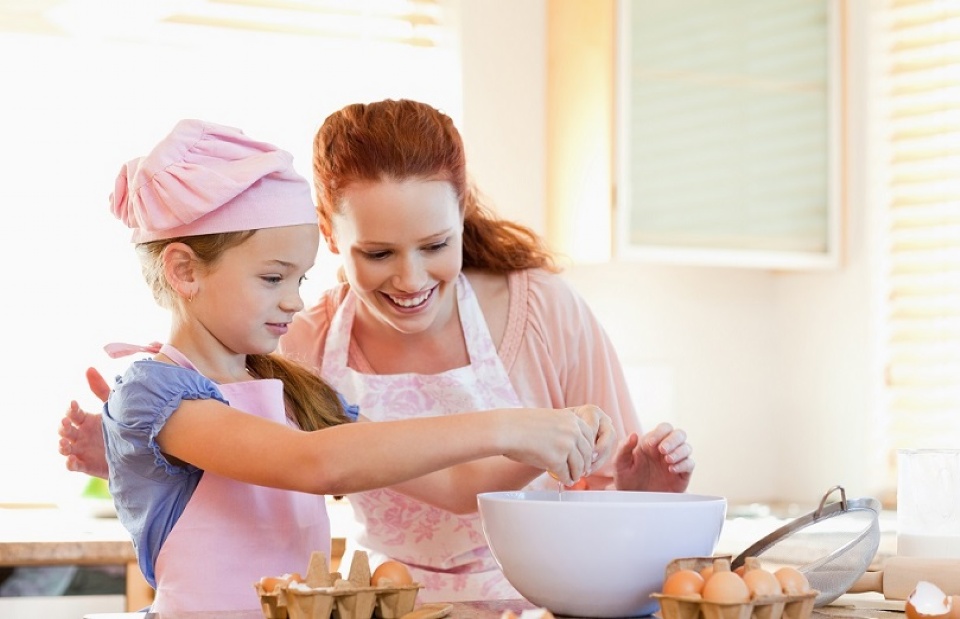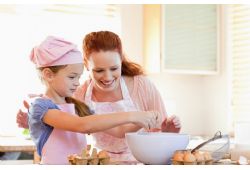In
the late nineties, home economics was removed from the province’s educational
curriculum. As a dietician and mother, I
believe that cooking is an essential life skill which should be taught in
schools. That being said, when it comes to meal preparation there is no teacher
more influential than a parent.
Unfortunately,
many of my clients struggle with preparing healthy meals because they lack
basic cooking skills. This is one reason many of us often resort to choosing processed
and packaged foods which are not the best for our health. I always encourage my
clients to eat home-cooked meals. When prepared right, meals cooked at home are
much more nutritious than store bought.
Cooking
is a skill that needs to be encouraged at an early age in order to equip your
children with the tools they need for optimal nutrition and health in the
future. The trick is to get your
children involved at every step of food preparation― make cooking a family
activity!
Have fun grocery shopping
Take
your children grocery shopping often and make it fun by giving them small tasks.
Picking out groceries is a real sensory experience for little ones. Get them involved
by assigning tasks such as filling up bags with fruit and vegetables. Children
are usually amazed by the sight, smell and touch of food. One way to foster their curiosity is by visiting
local farmers’ markets and farms. Whenever possible, try to choose locally grown
and/or seasonal ingredients. Fruit and vegetables that are grown far away spend
lots of time ‘on the road’ and have more time to lose nutrients before they
reach our plates.
Once
you get home, ask your children to help put away the groceries. Always praise
them for their participation; this will make them more likely to ‘help out’ in
the future.
Prepare together
Children
as young as toddlers and preschoolers can do lots in the kitchen! I
agree that including the kids in cooking meals requires time, patience, and some
extra clean-up, but trust me; it is well worth the effort and will pay off when
they are older. Young
children can wash fruit and vegetables, cut soft fruit with butter knife, mix
ingredients and help set up the table. Older children can make simple recipes
and teenagers can choose new recipes to cook.
A
fun activity is to go through cook books with your children and select recipes.
This not only helps with your grocery list, but it is the first step in
outlining a menu and cooking schedule for the week ahead –which is a must for busy
families!
Enjoy your food
Did
you know that kids are more likely to sit down to a family meal when they
helped prepared it? Make the best of family meals by creating a pleasant and
positive meal environment. At the dinner table, disconnect from devices and
turn off the TV and enjoy your time together as a family. It is not the
quantity but the quality of family meals that count. We put so much effort in
cooking and shopping for ingredients and don’t always take the time to savour
the final product.
Always encourage your children to try new foods
but don’t pressure them into eating it. Bribing kids to eat or forcing them to
finish their plate does more harm than good. In order to develop a positive
relationship with food, we have to respect everyone’s appetite!

 In The Latest Issue:Latest Issue:
In The Latest Issue:Latest Issue:
- A Bittersweet Farewell
- The new Laval Aquatic Co...
- The End of an Era:
Articles
Calendar
Virtual- ANNUAL TEACHER APPRECIATION CONTEST
- APPUI LAVAL
- ARTS & CULTURE
- CAMPS
- CAR GUIDE
- CCIL
- CENTENNIAL ACADEMY
- CHARITY FUNDRAISING
- CITYTV
- COSMODÔME
- COMMUNITY CONNECTIONS
- COVER STORY
- DINA DIMITRATOS
- ÉCOLE SUPÉRIEURE DE BALLET DU QUÉBEC
- EDITORIALS
- ÉDUCALOI
- EDUCATION
- EMPLOYMENT & ENTREPRENEURSHIP
- FÊTE DE LA FAMILLE
- FÊTE DU QUARTIER SAINT-BRUNO
- FAMILIES
- FESTIVAL LAVAL LAUGHS
- FÊTE DE QUARTIER VAL-DES-BRISES
- FINANCES
- GLI CUMBARE
- GROUPE RENO-EXPERT
- HEALTH & WELL-BEING
- 30 MINUTE HIT
- ANXIETY
- CHILDREN`S HEALTH & WELLNESS
- CLOSE AID
- DENTAL WELLNESS
- EXTREME EVOLUTION SPORTS CENTRE
- FONDATION CITÉ DE LA SANTÉ
- GENERAL
- HEARING HEALTH
- MESSAGES FROM THE HEALTH AGENCY OF CANADA
- MENTAL HEALTH
- SEXUALITY
- SOCIAL INTEGRATION
- SPECIAL NEEDS
- TEENS
- THE NUTRITION CORNER
- THE NUTRITION CORNER - RECIPES
- VACATION DESTINATION
- WOMEN'S FITNESS
- WOMEN'S HEALTH
- HILTON MONTREAL/LAVAL
- HOME & GARDEN
- INTERNATIONAL WOMEN'S DAY
- JAGUAR LAVAL
- LAVAL À VÉLO
- LAVAL FAMILIES TV SHOW
- LAVAL FAMILIES MAGAZINE CARES
- LAVAL URBAN IN NATURE
- LE PARCOURS DES HÉROS
- LES PETITS GOURMETS DANS MA COUR
- LEON'S FURNITURE
- LEONARDO DA VINCI CENTRE
- LFM PREMIERES
- LIFE BALANCE
- M.P. PROFILE
- MISS EDGAR'S AND MISS CRAMP'S SCHOOL
- MISSING CHILDREN'S NETWORK
- NETFOLIE
- NORTH STAR ACADEMY LAVAL
- OUTFRONT MEDIA
- PASSION SOCCER
- PARC DE LA RIVIÈRE-DES-MILLE-ÎLES
- PÂTISSERIE ST-MARTIN
- PIZZERIA LÌOLÀ
- PLACE BELL
- PORTRAITS OF YOUR MNA'S
- ROCKET DE LAVAL
- SACRED HEART SCHOOL
- SCOTIA BANK
- SHERATON LAVAL HOTEL
- SOCIÉTÉ ALZHEIMER LAVAL
- STATION 55
- STL
- SUBARU DE LAVAL
- TECHNOLOGY
- TEDXLAVAL
- TODAY`S LAURENTIANS AND LANAUDIÈRE
- TODAY`S LAVAL
- WARNER MUSIC
- THIS ISSUE
- MOST RECENT
Magazine
Why Parents Should Teach Their Kids to Cook
Articles ~e 105,7 Rythme FM 4 chemins Annual Teacher Appreciation Contest Appui Laval Arts & Culture Ballet Eddy Toussaint Camps THIS ISSUE MORE...
CONTESTS Enter our contests
CONTESTS Enter our contests
CALENDAR
Events & Activities
COMMUNITY Posts Events
PUBLICATIONS Our Magazine Family Resource Directory
LFM BUSINESS NETWORK Learn more
COUPONS Click to save!
COMMUNITY Posts Events
PUBLICATIONS Our Magazine Family Resource Directory
LFM BUSINESS NETWORK Learn more
COUPONS Click to save!
SUBSCRIPTIONS
Subscribe to the magazine
Un-Subscribe
E-NEWSLETTER Subscribe to our E-newsletter Un-Subscribe
WRITE FOR US Guidelines & Submissions
POLLS Vote today!
E-NEWSLETTER Subscribe to our E-newsletter Un-Subscribe
WRITE FOR US Guidelines & Submissions
POLLS Vote today!
ADVERTISERS
How to & Media guide
Pay your LFM invoice
SUGGESTIONS Reader's Survey Suggest a Listing
LFM About Us Our Mission Giving Back Contact Us
SUGGESTIONS Reader's Survey Suggest a Listing
LFM About Us Our Mission Giving Back Contact Us
 PICK-UP LOCATIONS
Get a copy of LFM!
PICK-UP LOCATIONS
Get a copy of LFM!
TERMS & CONDITIONS Privacy | Terms
ISSN (ONLINE) 2291-1677
ISSN (PRINT) 2291-1677
Website by ZENxDESIGN




 BY:
BY: 
Tweet
Share